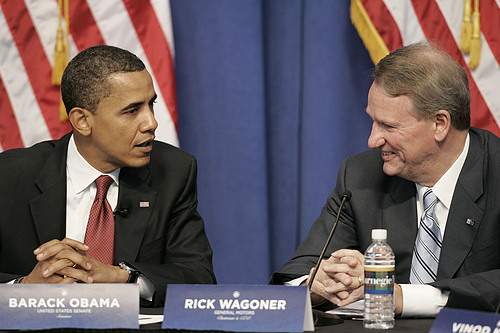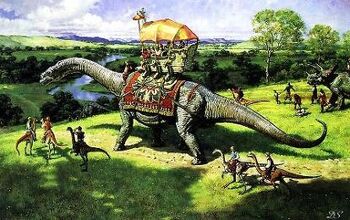Bailout Watch 142: ALL NEW! World's Most Extreme Detroit Apologists
Tonight. On World’s Most Extreme Detroit Apologists… Move over Jerry Flint! Forbes’ ancient and once venerable scribe thinks GM CEO Rick Wagoner hasn’t raped stockholders by pocketing more than $100m in executive compensation. But The Detroit Free Press‘ Justin Hyde and Brent Snavely are willing to go even further. While their most recent mega-apologia predicts the end of Wagoner’s misguided management, the writers are happy to give the floor to analysts who suggest that Wagoner’s done- and is still doing— a great job. “Erich Merkle, an analyst from Crowe Horwath LLP, said Wagoner inherited years of bad decisions from previous managers that have limited his options. ‘You almost need to put Roger Smith on the hot seat, and I know he’s dead,’ Merkle said of the CEO who led GM from 1981 to 1990. ‘They were setting the company up for disaster later down the road. The business model that was created and the way that the contracts were structured were such that they were just not economically viable.'” Mea culpa be damned. And you can be damned sure that Merkle isn’t the only one blind to Wagoner’s cataclysmic effect on GM’s business…
Hyde and Snavely point out that an anyone who bought $10k worth of GM stock in June 2000 — when Red Ink Rick was named president and CEO — would see their stake diminish to just $860. And yet, “GM’s decline has done little damage to Wagoner’s stature among industry executives because its Detroit rivals have done no better. ‘Rick is very highly respected, and he is a very good leader,’ said Neil DeKoker, president of the Original Equipment Supplies Association. ‘They are just facing challenges that are bigger than any one individual or group of individuals can handle.'”
So it is just a question of great landing too short runway. Aaron Bragman, automotive analyst for IHS Global Insight, say yes. “Ehe biggest criticism he hears of Wagoner is that while change has occurred, it hasn’t happened fast enough. ‘And actually, I have been fairly impressed with his turnaround plan,’ Bragman said. ‘They have gone from being largely a group of fiefdoms around the world to what seems to be a very well coordinated company.'”
R-E-S-P-E-C-T. Tell me what Rick means to thee. “‘I think he’s as respected as anybody in the industry. I think he’s earned that. He’s been managing in a very difficult period,’ said David Cole, chairman of the Center for Automotive Research in Ann Arbor. ‘You’ll see that he has led a very important transformation.'”
And that’s what happens when you got and look for… Detroit’s Most Extreme Apologists.
More by Robert Farago
Latest Car Reviews
Read moreLatest Product Reviews
Read moreRecent Comments
- SCE to AUX Norway is in Europe, and Tesla is an American automaker - no problems there.I wouldn't use Ford as the bellwether.https://www.reuters.com/business/autos-transportation/tesla-extends-lead-norway-evs-take-record-82-market-share-2024-01-02/https://elbil.no/english/norwegian-ev-policy/
- Steve Biro If the U.S. government wants to talk about banning all connected cars - or at least the collection and sharing of information from said vehicles - I’m all ears. Otherwise, don’t waste my time.
- Ajla Both parties are in favor of banning Chinese vehicles so I don't see how it won't happen in the next year.
- Add Lightness I don't waste a lot of time watching nothing much happening by watching the YouTube 6 minute highlights.
- MrIcky from my rental fleet experience, id rather drive one of these than a camry.


































Comments
Join the conversation
David Cole, head of the Center for Automotive Research is a complete buffoon, far removed from reality and a total tool of the US auto industry. I'll laugh when, unlike GM, Ford and Chrysler "employees" who are paid to not work, he's on the unemployment line. It's apologists like him, on the industry's dole, who help keep us from a real solution for the industry, which is on death's door.